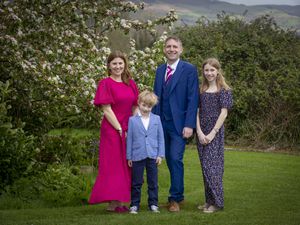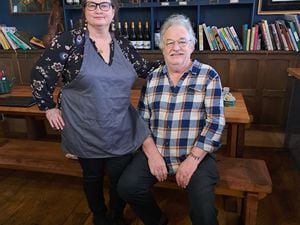Shropshire family's heartache is put down in book
Sue Dewhirst knelt down next to her husband, and looked into her teenage son's eyes. "I saw his spark had gone and that he wasn't coming back," she recalls.
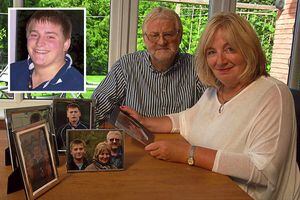
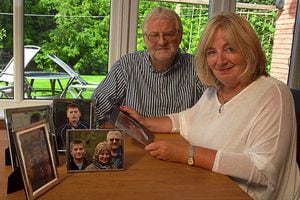
"I went to shut his eyes, but the doctors urged me not to as they wanted to keep trying CPR. They tried, it seemed, for an eternity. But he had died."
Nothing can prepare any mother for the premature death of a child, and no words can fully capture the pain that goes with losing a son or daughter.
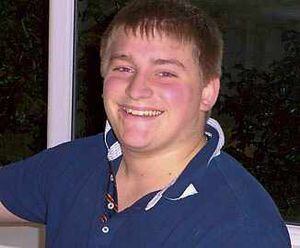
But Sue, whose son Matthew died from a sudden cardiac problem at the age of 17, is sharing her ordeal in a new book which she hopes will help other mothers who have experienced similar tragedies come to terms with their ordeal.
Sue, from St Martin's, near Oswestry, is one of 10 women who have written the chapters no mother should ever have to write in a new book produced by the charity Cardiac Risk in the Young (Cry).
According to the SADS Foundation, sudden arrhythmia death syndromes (Sads) are genetic heart conditions that can cause sudden death in young, apparently healthy, people.
Sads conditions occur because the electrical system of the heart is not working properly, so that the heart beats with an abnormal rhythm.
These conditions can be treated and deaths can be prevented.
Warning signs of Sads:
Family history of unexpected, unexplained sudden death under age 40
Fainting or seizure during exercise, excitement or startle
Consistent or unusual chest pain and/or shortness of breath during exercise
Because Sads condition are passed down from parent to child, each child of an affected parent has a 50% chance of inheriting the condition. It is estimated that over half of the 4,000 Sads deaths each year of children, teens, or young adults have one of the top two warning signs:
Family history of a Sads diagnosis or sudden unexplained death (usually undiagnosed and untreated) of a family member
Fainting
For more information visit:
The SADS Foundations at www.sads.org
Cardiac Risk in the Young (Cry) at www.c-r-y.org.uk
The book, entitled Young Sudden Cardiac Death: A Mother's Grief, has been compiled by the charity's founder Alison Cox, and each chapter recalls the personal experience of suddenly losing their son or daughter to a previously undiagnosed heart condition.
Every week in the UK, 12 people under the age of 35 will die suddenly from a previously undiagnosed heart condition. Of these, 80 per cent will have no signs or symptoms, and the only way to detect the condition is through a Cry screening test.
In the book, Sue recalls the day in July, 2012, when she received a call from Matthew's school, Ellesmere College.
She says: "I'd just finished shopping when I received a call from the college sister asking me to get there as Matthew had had 'one of his turns'.
"I was more annoyed than concerned, as these 'turns' had been frequent over the past nine years and dismissed every time by the emergency doctors as stress, migraine and dehydration. The doctors had always told him he must 'drink more', which is what I told the sister that day."
She called her husband Chris, who was nearer to the school, before making her own way to Ellesmere. And she will never forget the sight that greeted her when she arrived.
"I arrived to see an ambulance, police car and helicopter on the school rugby field, with my husband kneeling next to Matthew who was on a ventilator," says Sue, who is 56.
"I remember Chris looking up at me, sobbing, 'he's gone, what are we going to do?' I just felt numb, too shocked to cry, wanting only to stay with Matthew. He was still warm. I know I fainted.
I stroked his head and held his hand as we waited in the ambulance for police statements to be completed and the funeral directors to take him to the mortuary."
The following morning it fell to her and Chris to tell other family members.
"My mother has dementia, and I was unsure whether she would understand me but, even to this day, it is the only thing in her recent life that she remembers," says Sue.
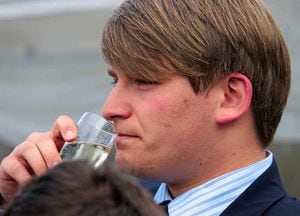
"Chris's mother, who was 92, lived in a nursing home and sobbed how wicked life was to take his life and not hers. Everyone was disbelieving. How could this fit, healthy 17-year-old suddenly die?"
And it seems Sue and her family were not the only ones who struggled to understand why a strapping teenage rugby player would die so suddenly.
"The authorities were unhelpful, including the police, who initially suspected Matthew of being a drug abuser due to his size and muscle strength," says Sue.
A toxicology report proved that Matthew was clean of drugs and alcohol, and Sue says his interest in sport and fitness meant any abuse of his body would have been out of the question.
Sue and Chris's grief was compounded by the fact that Matthew was their only son, conceived after nine gruelling attempts at IVF. She says that for many years Chris had been regularly passing out on the rugby pitch, but had been repeatedly assured that nothing was wrong.
"I still blame myself for telling Matthew to drink more," she says.
"But the ongoing reassurances of doctors and nurses that 'you only have to look at him to see there's nothing wrong with his heart' constantly reconfirmed to me that, whatever it was, it was nothing serious."
It was the assistant coroner who put the Dewhirsts in touch with Cry, and Sue found the charity's support invaluable.
"We didn't attend the inquest," she says.
"We now knew he had died of sudden arrythmic death syndrome (Sads) and felt grievously let down by the NHS doctors who had had so many opportunities over the years not only to refer him for further investigations but were also ignorant of Sads."
She admits she once gave her GP "both barrels" for not being more knowledgeable about sudden cardiac deaths. However, she now praises the same doctor for the support that she gave in the months that followed.
On April 18 the charity will hold a support day for bereaved mothers at the Burlington Hotel in Birmingham
In the meantime, Sue has had to learn to adapt to life without Matthew.
"Matthew's bedroom is still exactly as he left it that Thursday morning," she says.
"Matthew was my only child," she says.
"We had fun together always, and I treasure the memories of the time we had."


